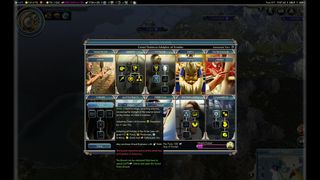
You say you want a revolution...
1926 A.D.: Copenhagen is besieged with the aid of the UNK's fresh 2nd Artillery.
1927 A.D.: The Democratic Socialist Party comes into power in the UNK parliament, leading to a brief period of civil strife that ends with the adoption of a socialist form of government. The UNK is officially renamed the NDU (Norse Democratic Union). The rioting is worst in formerly-Danish Aarhus, where the citizens only recently released from the tyrannical rule of the Danish king are most eager for change. Yet, even in Stockholm and Sigtuna, greedy guild leaders who have been running rackets for over a century are dragged from their homes and killed. The honorary offices of the royal family are done away with as well. Sweeping and decisive action by the new parliament eventually restores order, though the nation is left forever changed.
At this point in the game, you have the choice to go into one of three mutually-exclusive policy trees: Freedom, Autocracy (Facism), and Order (Socialism). For an empire of my size and the strategy I'm going for, Order made the most sense. Freedom best fits smaller empires, and Autocracy is almost entirely military-focused. Order gives me huge production bonuses, keeps my people happier (offsetting the frowny faces from occupying most of Denmark), and perhaps most importantly, increases the strength of my units by 25% in friendly territory. Yeah, what up Greece?
1928 A.D.: Copenhagen is captured, and the Danish government is forced to flee West to Tunsberg.
Six of the twelve civs that started this game have lost their capitals. Being the last to hold mine would win me a domination victory, but again, that's not my goal.
The biggest gaming news, reviews and hardware deals
Keep up to date with the most important stories and the best deals, as picked by the PC Gamer team.
Most Popular



